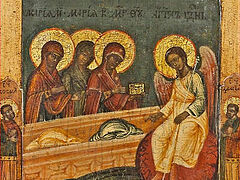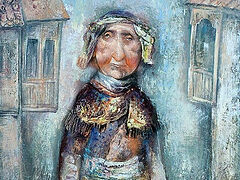2 Cor. 9:6 But this I say, He which soweth sparingly shall reap also sparingly; and he which soweth bountifully shall reap also bountifully. 7 Every man according as he purposeth in his heart, so let him give; not grudgingly, or of necessity: for God loveth a cheerful giver. 8 And God is able to make all grace abound toward you; that ye, always having all sufficiency in all things, may abound to every good work: 9 (As it is written, He hath dispersed abroad; he hath given to the poor: his righteousness remaineth for ever. 10 Now he that ministereth seed to the sower both minister bread for your food, and multiply your seed sown, and increase the fruits of your righteousness;) 11 Being enriched in every thing to all bountifulness, which causeth through us thanksgiving to God.
After the Lord’s departure to Heaven, first preaching the Gospel in Judea and then among other nations, the Holy Apostles firmly remembered the Lord’s commandment about love as the primary sign of following Him: By this shall all men know that ye are My disciples, if ye have love one to another (Jn. 13:35). Firmly observing this commandment of the Lord among themselves, the Apostles tried to instill it in all who came to believe in Christ through their preaching. The first manifestation of this love was unity of spirit and the unity of possessions. To serve the poor, the Apostles chose seven deacons (Acts 6:5). At that time, no one called anything their own, but everything was held in common (Acts 4:32). That’s how it was at first with the Mother Church—the Church of Jerusalem—and then in other Churches.
When they sent St. Paul to preach among the Gentiles, the Apostles asked him not to forget the Christian brethren of Jerusalem who were suffering because of the oppression of unbelieving Jews and the famine that had befallen their country. The Apostle Paul carefully tried to fulfill the covenant of the Lord Jesus Christ. Among his apostolic labors, he assumed responsibility for gathering alms. Upon returning to Jerusalem, he invited those whom he had converted to the faith, including the Corinthian Christians, to take care before his arrival to collect alms for the Jerusalem brethren, and when he would come, to send what they collected with him.
In his epistle to the Corinthians, which we read today, the Apostle instructs them on how to give alms so that it would be pleasing to God and fruitful for those who give the alms, and that a feeling of gratitude to God would be born in those who receive the alms. The Apostle compares alms and charity in general, as works of Christian love, with the sowing of seeds and says: He which soweth sparingly shall reap also sparingly; and he which soweth bountifully shall reap also bountifully (2 Cor. 9:6). That means: Whoever gives alms, let him do so without avariciousness, generously, knowing that the more he gives, the more he receives, just like a farmer—the more he sows, the more he reaps; but whoever sows little, reaps little.
Charity is a gift to God. Whoever wants his gift to be accepted by God must sacrifice according to the disposition of his heart, not grudgingly, or of necessity: for God loveth a cheerful giver (2 Cor. 9:7). Some refrain from giving alms to the poor, from participating in public charity, justifying it to themselves by saying they’re worried about becoming poor themselves from giving generous alms. As if to forestall such excuses, the Apostle says: Your fears are in vain, for God is able to make all grace abound toward you; that ye, always having all sufficiency in all things, may abound to every good work (2 Cor. 9:8). People don’t become poor from being generous with alms, but from being too stingy to even give a little bit for those in need while being too generous with themselves, with satisfying their own whims.
As it is written, He hath dispersed abroad; he hath given to the poor: his righteousness remaineth for ever (2 Cor. 9:9). The Apostle brings forth a witness to the truth of what’s said—the prophetic saying that he who distributes alms with a generous hand shall never become impoverished (Ps. 111:9). Even if his means for a temporary luxurious life become scarce, his truth and righteousness will never become scarce. Sometimes, in His incomprehensible ways, the Lord doesn’t give a reward here for giving alms. Almsgivers may need help from men sometimes too, but that doesn’t mean God has forgotten the almsgiver, for He has mercy and recompense prepared for the merciful. The merciful shall receive mercy (Mt. 5:7). Their righteousness will abide forever: They’ll be with the righteous in eternity.
So, let us not be avaricious—rather, let us scatter our goods with a generous hand. St. John Chrysostom says:
Don’t you see how much others give to comedians and dissolute women? Give Christ at least half as much as others give to comedians and dissolute women. Give Christ at least half as much as they give dancers; give at least as much to the hungry as they, in their vanity, give to performers at public spectacles. They adorn the bodies of the dissolute with much gold, and you don’t want to clothe the flesh of Christ in even simple clothes, even when you see Him bare. You spend willingly on empty things, but when you need to clothe someone’s poverty, you consider yourself the poorest of all.
Such instruction from this Holy Father is no less pertinent for our times than for the society of his times.
Let us continue the explanation of the Apostolic reading. In order to further endear the Corinthian Christians to the willing and generous giving of alms, he forestalls the fear of some that if we generously give to others, we ourselves could become impoverished and find ourselves in need of someone else’s help. The Apostle persuades them to abandon these fears and combine this conviction with prayer so that God, Who gives seed to the sower and bread for food, might give abundance to what they have sown and multiply the fruits of their righteousness (2 Cor. 9:10). With these words of prayer, he expresses the desire that God might bountifully reward us for our generous alms with the multiplication of earthly, material goods; that we might not want for anything; and moreover, that He might multiply the fruits of their righteousness—that righteousness that manifests itself through charity, for it’s said that the merciful shall receive mercy (Mt. 5:7). This is the first fruit of righteousness.
Further, the righteousness of those who disperse their possessions for alms to the poor remains forever (2 Cor. 9:9). That is, even if they have a temporary scarcity of earthly goods, still, their goodness will remain in God’s memory forever, and they’ll receive a hundredfold recompense from Him. This is another fruit of righteousness.
So, the Apostle concludes, don’t be miserly, don’t fear impoverishment, but be enriched in every thing to all bountifulness, which causeth through us thanksgiving to God (2 Cor. 9:11). And another incentive for Christians: Generous almsgiving works the same gratitude to God in those who receive it; and that means that in giving alms, we glorify God, inspiring gratitude to Him in those whom we generously help. And if we glorify God, then God will glorify us according to His immutable promise: Them that honour Me I will honour (1 Kg. 2:30).
Thus, the whole Apostolic reading for today comprises an instruction on almsgiving. There are lessons here for many of us, or rather, for all of us. The lesson for those who love to give alms unstintingly in the name of Christ is that those who sow generously will also reap generously; those who give in the name of God will also receive a reward from God: the multiplication of the fruits of righteousness—life eternal. The lesson for the vainglorious, for those who love to give alms and sound abroad about it in order to be glorified by people, is that they receive their wages here and therefore don’t receive any Heavenly rewards (Mt. 6:2). This lesson is also for those who turn away from the beggar who stretches out his hand to them, but when there’s some public cause to help those in need they try to outdo others by offering more, or at least not lagging behind, often doing it grudgingly, sadly, unwillingly, murmuring against those who initiated the cause. These are not willing givers. The main inspiration for such alms is vainglory. Such people aren’t deserving of God’s love.
Thus, let us give alms generously in the expectation of a generous reward from God; or even better, simply out of love for those in need, as to our brethren in Christ, not expecting any kind of reward at all. Let us give neither out of vainglory nor for show, but for the sake of God, according to the commandment of Christ—so that the left hand doesn’t know what the right is doing (Mt. 6:3). And God, Who sees in secret, will reward us openly (Mt. 6:4).




